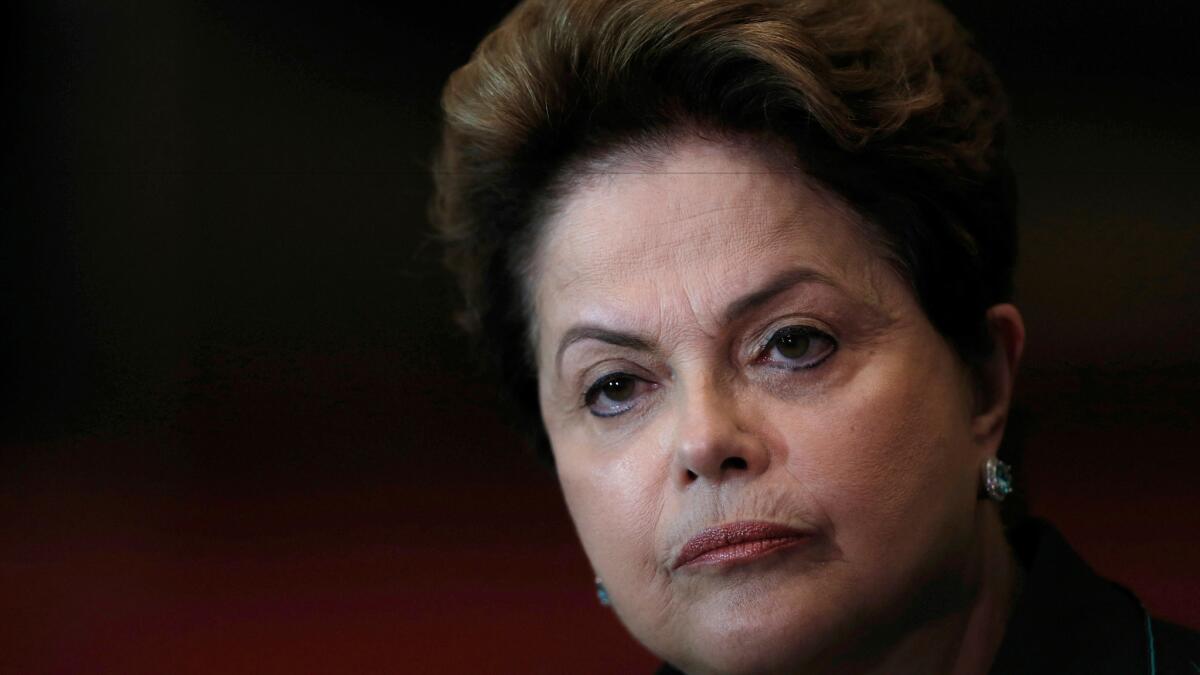Brazilian President Dilma Rousseff: My impeachment threatens democracy

Reporting from Sao Paulo — Brazilian President Dilma Rousseff took the stand at her impeachment trial in the country’s Senate Monday, and accused Brazil’s elites of threatening democracy in Latin America’s largest country.
Rousseff, Brazil’s first female president and a member of the left-wing Workers Party which had controlled the presidency since 2003, was removed from office in May. She is expected to have her mandate permanently terminated by a Senate vote by Wednesday for violating budgetary laws.
“Like everyone, I have defects, and I make errors,” said Rousseff. “But my defects do not include treachery or cowardice.” She reminded those listening of the torture she suffered under Brazil’s military dictatorship, denied she had committed any crime, and said politicians and powerful business interests were using an empty impeachment process to overturn her election.
“What is at stake here is not just my presidency,” Rousseff said. “What is at stake is the principle of respect for the ballot box, the sovereign will of the Brazilian people, and the constitution.”
During hours of questioning, the suspended president defended her economic decisions. Lawmaker Ana Amelia questioned Rousseff’s use of the word “coup.”
“If there is no proof of any crime, senator,” Rousseff replied, “then this is indeed a coup.”
Rousseff has not been accused of personal corruption or any criminal offense, even as a multibillion-dollar corruption scandal around the state-run Petrobras oil company led to the imprisonment of many of Brazil’s business and political leaders.
She is accused of using money from public banks to temporarily cover budget deficits in the run-up to her reelection in 2014. But many analysts believe this act alone would be insufficient to ensure her removal, and that political considerations may ultimately decide Rousseff’s fate.
See the most-read stories in World News this hour »
Rousseff’s popularity plummeted as the economy tanked in her second term and she lost the support of Congress, many members of which have their own legal troubles. At least 60% of the senators that will vote this week are facing charges of corruption or other serious crimes. But these lawmakers – both former members of Rousseff’s coalition and opposition to her government – can legally remain in power until they are tried, a lengthy process since they have a right to argue their cases in the Supreme Court.
Secretly recorded conversations leaked after Rousseff’s removal suggested that some politicians voted to oust her in order to stop the corruption inquiries.
Both houses of Brazil’s Congress already voted to remove Rousseff earlier this year pending final judgment, and there’s been little evidence many lawmakers now plan to vote to reinstate her.
“Rousseff was speaking Monday more to history than to specific legal questions or to convince senators to change their minds,” said Ana Paula de Barcellos, professor of constitutional law at the Rio de Janeiro State University.
There is no consensus among legal scholars that Rousseff’s budget irregularities actually constitute an impeachable offense, she added, but the Supreme Court allowed the Senate to make the final decision on that question. “This trial has a very strong political element, and the political polarization we are living through has also affected the world of judicial specialists.”
In May, Vice-President Michel Temer, a member of the Democratic Movement Party who abandoned Rousseff to support impeachment, took over as interim president. He began governing as if her removal had already been finalized, removing her ministers and installing a cabinet made up entirely of white men, and overseeing a rightward turn on issues like social spending and foreign policy.
Much to the chagrin of former ally Rousseff, interim President Temer oversaw the Rio 2016 Olympics, where he was booed at the Opening Ceremony and then declined to participate in the Closing Ceremony. Temer nevertheless has the support of Congress, as well as many major market players.
Rousseff believes her impeachment is the product of forces similar to those that brought about the 1964 military coup and subsequent dictatorship.
“The truth is that the result of the 2014 election was a difficult blow for parts of Brazil’s conservative elite,” Rousseff said, “and with the wide-open support of parts of the media, they created the political climate that was necessary to overturn my election.”
“Today, Brazil, the world, and history are watching us,” she said.
Bevins is a special correspondent.
ALSO
China once struggled to feed its people. Now it’s seeing a rise in eating disorders
U.S. intelligence sees Islamic State as weakened after series of defeats
French court’s suspension of town’s ‘burkini’ ban may bring a lengthy legal and political battle
UPDATES:
1:09 p.m.: This article was updated with Times reporting.
7:49 a.m.: This article has been updated with additional details.
This article was originally published at 7 a.m.
More to Read
Sign up for Essential California
The most important California stories and recommendations in your inbox every morning.
You may occasionally receive promotional content from the Los Angeles Times.










